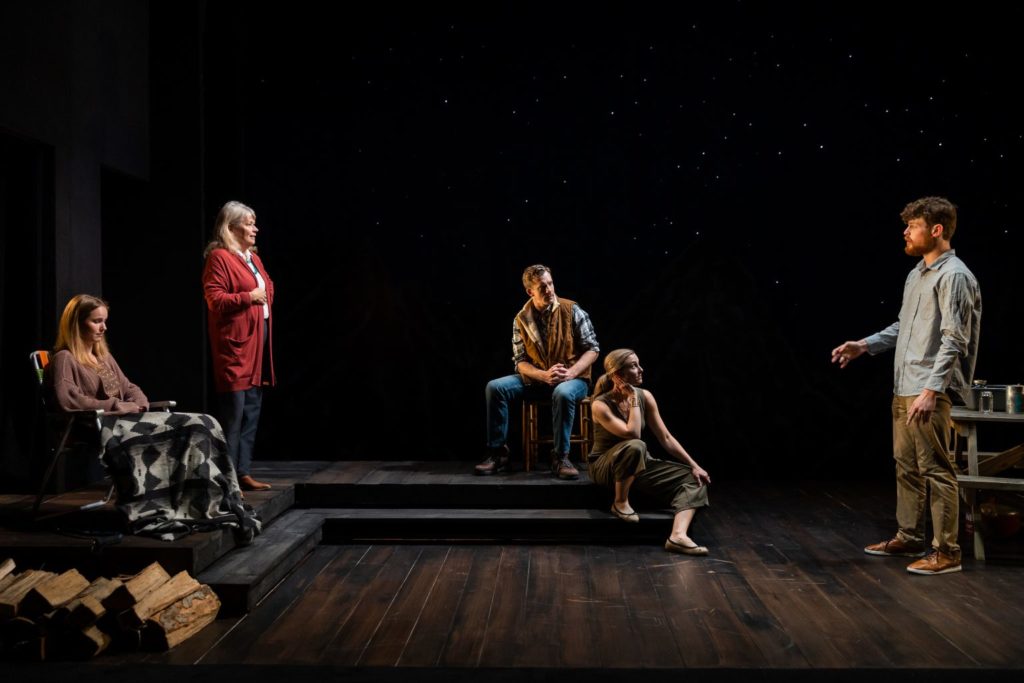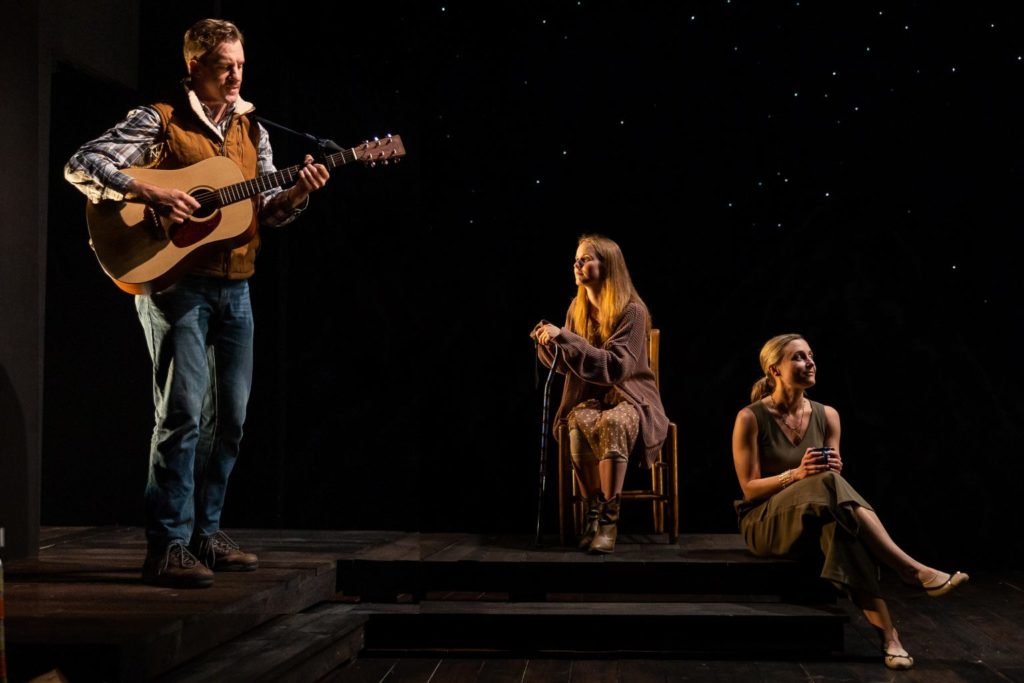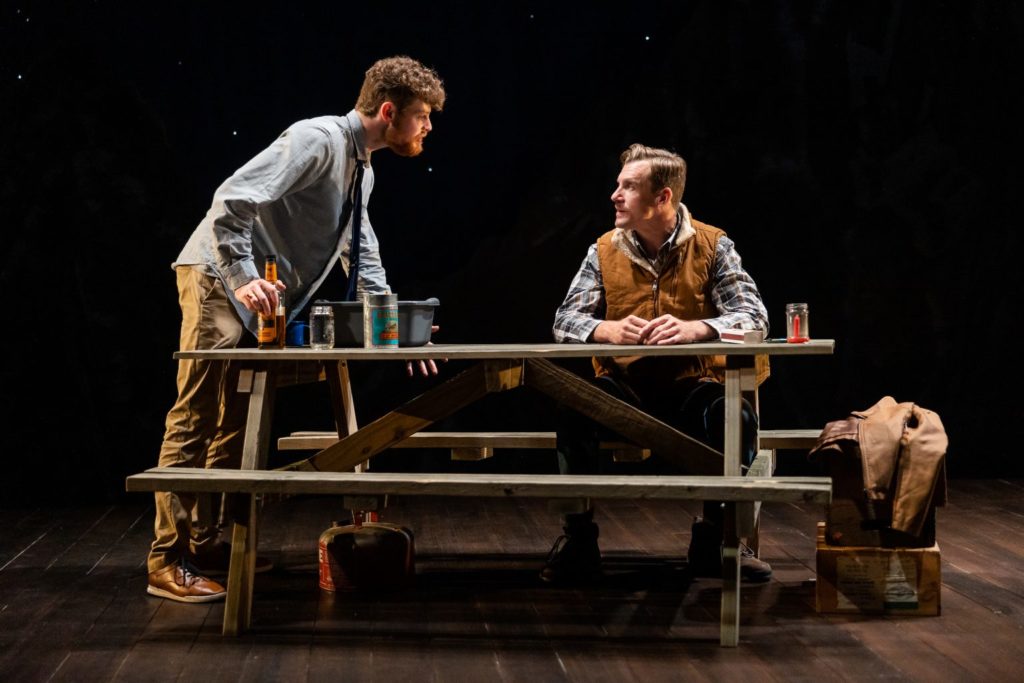
Elise Piliponis, Karen MacDonald, Jesse Hinson, Dayna Cousins, and Nathan Malin in Heroes of the Fourth Turning. Photo by Nile Scott Studios.
Presented by SpeakEasy Stage Company
By Will Arbery
Directed by Marianna Bassham
Featuring Karen MacDonald, Dayna Cousins, Jesse Hinson, Nathan Malin, and Elise Piliponis
September 9 – October 8, 2022
The Roberts Studio Theatre in the Stanford Calderwood Pavilion
Boston Center for the Arts
527 Tremont Street
Boston, MA
This show runs one hour and 55 minutes with no intermission.
Critique by Kitty Drexel
“…Yeah, they’re not even inviting us to this conversation. It’s this insane thing that they’re all getting hung up on, this small minority of confused people, but all the people, all the people like suddenly so defensive about using the word ‘they’ but ‘they’ doesn’t make any damn grammatical sense.”
– Justin, Holy Fool, from Heroes of the Fourth Turning by Will Arbery
“Have you ever danced with the devil in the pale moonlight?”
-Jack Nicholson as The Joker in Batman (1989)
BOSTON — Merriam-Webster primarily defines religion as “a personal set or institutionalized system of religious attitudes, beliefs, and practices.” The definition branches off into sub-definitions: service and worship of God or the supernatural, commitment to religious faith, and a system of beliefs “held to with ardor and faith.” Alas, Merriam-Webster doesn’t tell us which religion will get one into Heaven (or if there even is a Heaven.)
The antagonizing white, conservative, protagonists of Will Arbery’s Heroes of the Fourth Turning attack each other in the name of God’s perfect love. They use their Catholic faith and rigid dogmas to interrogate the each other in the name of friendship. They are insecure people sloppily looking for answers to life’s biggest questions: Why are we here? What is our purpose? Who will love me? If God loves all of us, why do I feel so alone? These Samaritans might identify as Catholic but, over the course of an evening, we discover each person expresses love differently.
Heroes of the Fourth Turning focuses on a small Catholic community in Western Wyoming. Kevin (Nathan Malin), Teresa (Dayna Cousins), and Emily (Elise Piliponis) have gathered in Justin’s (Jesse Hinson) backyard to celebrate Gina (Karen MacDonald), their spiritual mentor and newly appointed president of ultra-conservative Transfiguration College of Wyoming. It is 2017. All news outlets are broadcasting the story of white nationalists who bore their tiki torches in protest of the removal of a statue of Robert E. Lee on the University of Virginia campus. This group of friends discusses the attacks on their far-right community from the liberal left, interpretations of faith, politics, and their shared history. As they drink and debate, they experience religious and personal revelations.
Heroes of the Fourth Turning is about conservative, young Catholics, sure. It’s about anyone who drinks deeply from the chalice of fanaticism flavored Kool-Aid, left or right. The spotlight of this play happens to be on conservative Catholics on the precipice of disaster/change.
For full transparency, I am what the Unitarian Universalists call a recovering Catholic. I was raised Catholic in a devout but “liberal” family. We attended church every Sunday, on the big holidays, during Holy Week, and on some of the more fancy feast days when we poo-pooed the lesser believers for not being there too.

Jesse Hinson, Elise Piliponis, and Dayna Cousins in Heroes of the Fourth Turning. Photo by Nile Scott Studios.
My experiences closely resemble those of the characters in Heroes of the Fourth Turning. I attended religious classes before or after church until I was 18. I’ve received all the big sacraments: baptism, first communion, first penance, and confirmation. I secretly harbored a sincere desire to join the Carmelite Nuns until I was 18. God was my homie. I was in it to win it.
And then, around the age of 23, I picked up a copy of The Gnostic Gospels by Elaine Pagels at an independent bookstore. My housemate showed me the 1999 movie Stigmata. I whipped through The Gospel of Mary, texts by Aleister Crowley, and The Talmud.
My Catholic faith was rent asunder. I pried myself out of my guilt, fear, and obedience like a ravenous vampire out of its inhumed coffin. I was troubled and my insurance didn’t cover talk therapy. So I started paying attention to the sermons at the UU church where I sang in the choir on Sundays for a meager $50 a service. My nascent faith expanded to consider beliefs beyond my greatest imaginings.
I have great compassion and empathy for the imperfect characters in Heroes of the Fourth Turning. Religion should be a comfort and guide. These characters are seeking truth and meaning from a church experience that manipulated their thoughts and actions for decades. Their desire to believe has stranded them in personal islands of impotent loneliness. Spiritual isolation can feel like God has abandoned you. They must be terrified.
Dayna Cousins, Jesse Hinson, Nathan Malin, and Elise Piliponis give excellent performances. Each actor drew out the opposing foils of their cast members. Hinson and Malin, and Piliponis and Cousins bounced off of each other like similarly-charged magnets. They send each other careening across the stage until one of them actually vomits.
Their work is so believable that it reminded me of the questioning kids I grew up with in my insulated hometown. Malin was a droopy incel whining about his lack of faith while pedantically quoting philosophy. Piliponis is a savage martyr wielding her faith like a weapon of mass destruction. Cousins, the most narcissist of the Heroes, regurgitates the rhetoric of the far-right so vacuously that she’s inscrutable. Worst/best of all, Hinson lulls the audience into believing he’s a voice of stoic reason with a calming, good ole boy demeanor. He’s just as extreme as everyone else.
Karen MacDonald approaches the stage with the ferocity of a tornado. Her Gina tears into these disciples with all her years of experience and impatience for young’uns who think they’re reinventing Catholic theology. By the time Gina enters, the audience wants to see these whippersnappers taken down a peg. MacDonald takes the stage from her fellow cast members; her character hands them their asses. It would be beautiful to behold if weren’t certain her disciples would learn nothing from it.
The sound design by Elizabeth Cahill skipped a spectrum of cheerful to creepy AF. Throughout the performance, Cahill layered ambient noises to covertly put us in a Wyoming backyard. The pre-performance cricket noises were a nice touch.

Nathan Malin and Jesse Hinson in Heroes of the Fourth Turning. Photo by Nile Scott Studios.
Heroes of the Fourth Turning isn’t about revealing what the right says; we already know what the right says from Fox News. Heroes of the Fourth Turning shows us how these characters come to believe what they say. By making us understand them, Arbery is forcing us to see their humanity.
Arbery intends us to have compassion for his characters. We may disagree with their viewpoints – which is legit because they say some horrendous things- but we can empathize with their emotional and mental struggles, too. By having compassion for these characters, perhaps we can have compassion for our own foibles.
Merriam-Webster added the singular, non-binary pronoun “they” to its dictionary in September 2019 (the same month Arbery’s play premiered at Playwright’s Horizons in New York). In web posts about its addition, Merriam-Webster’s editors assert that English is a living language; the dictionary adds words and updates definitions when common usage necessitates it. It’s why Merriam-Webster includes slang such as Dis and Staycation. The dictionary serves language, not the opposite.
The good folx at Merriam-Webster don’t mince politics. They-singular is included because people use it. The website says, the English “language’s lack of an exclusive gender-neutral pronoun is a famous deficit, and ‘they’ has been quite ably filling in for more than 600 years.”
The AP Stylebook has advocated for the singular-they since 2017. Both the Associated Press and Merriam-Webster are authorities on the English language. If both say the singular-they is acceptable, it is.
Use whatever pronouns you want. Do what you will so long as it harms none. Including yourself. Self-realization is hard enough without the people and institutions we trust telling us our true selves are inherently evil.
The Catholic church taught that Limbo existed for centuries until 2007 when all of a sudden it didn’t exist anymore. It hushes up a lot of dirty, unchristian scandals all of the time. A few pronouns brought about by independent thinking here and there are the least of its worries.
